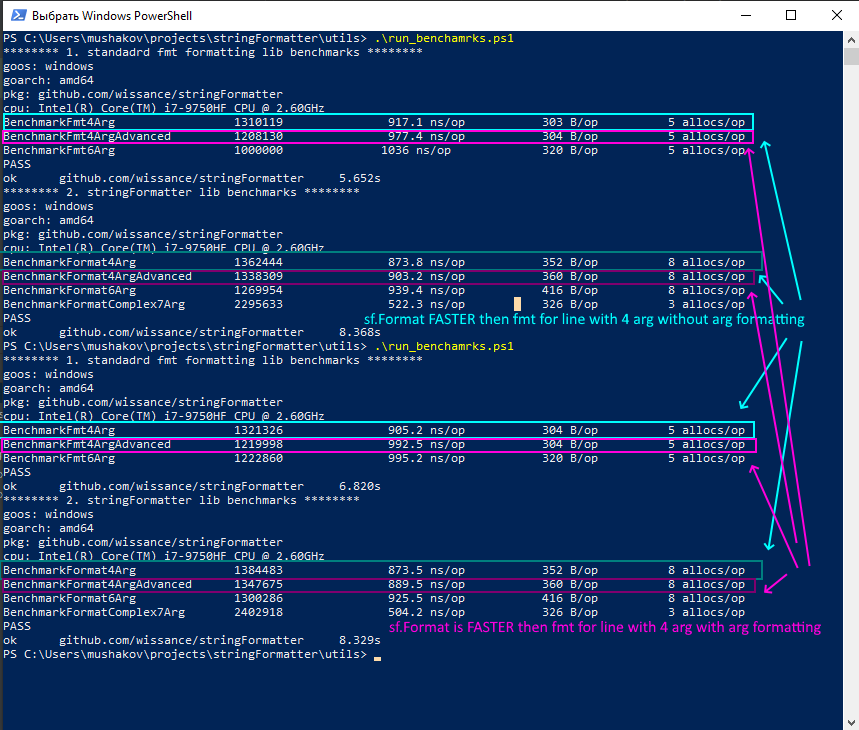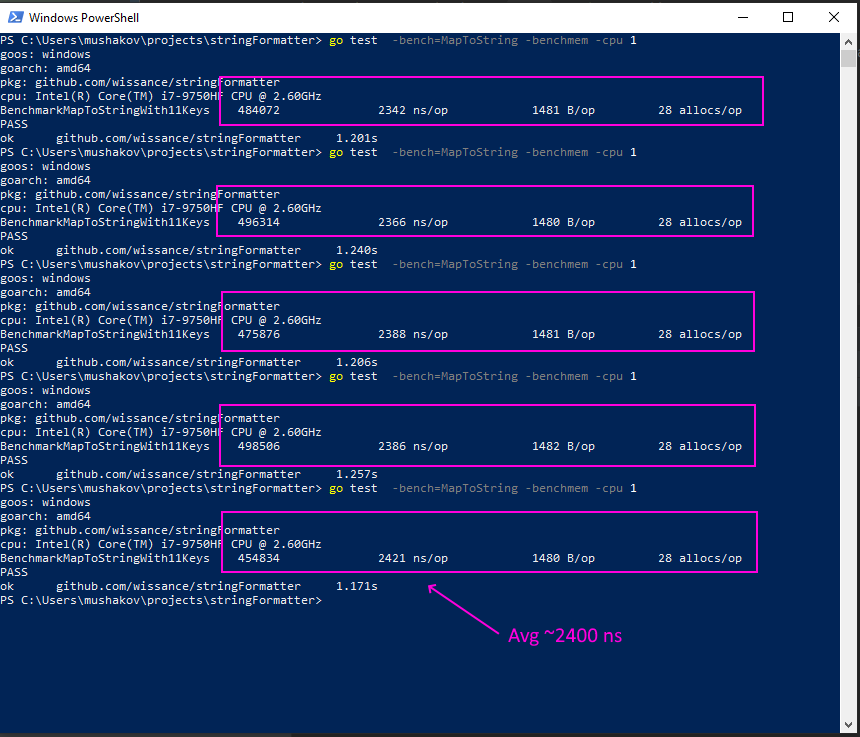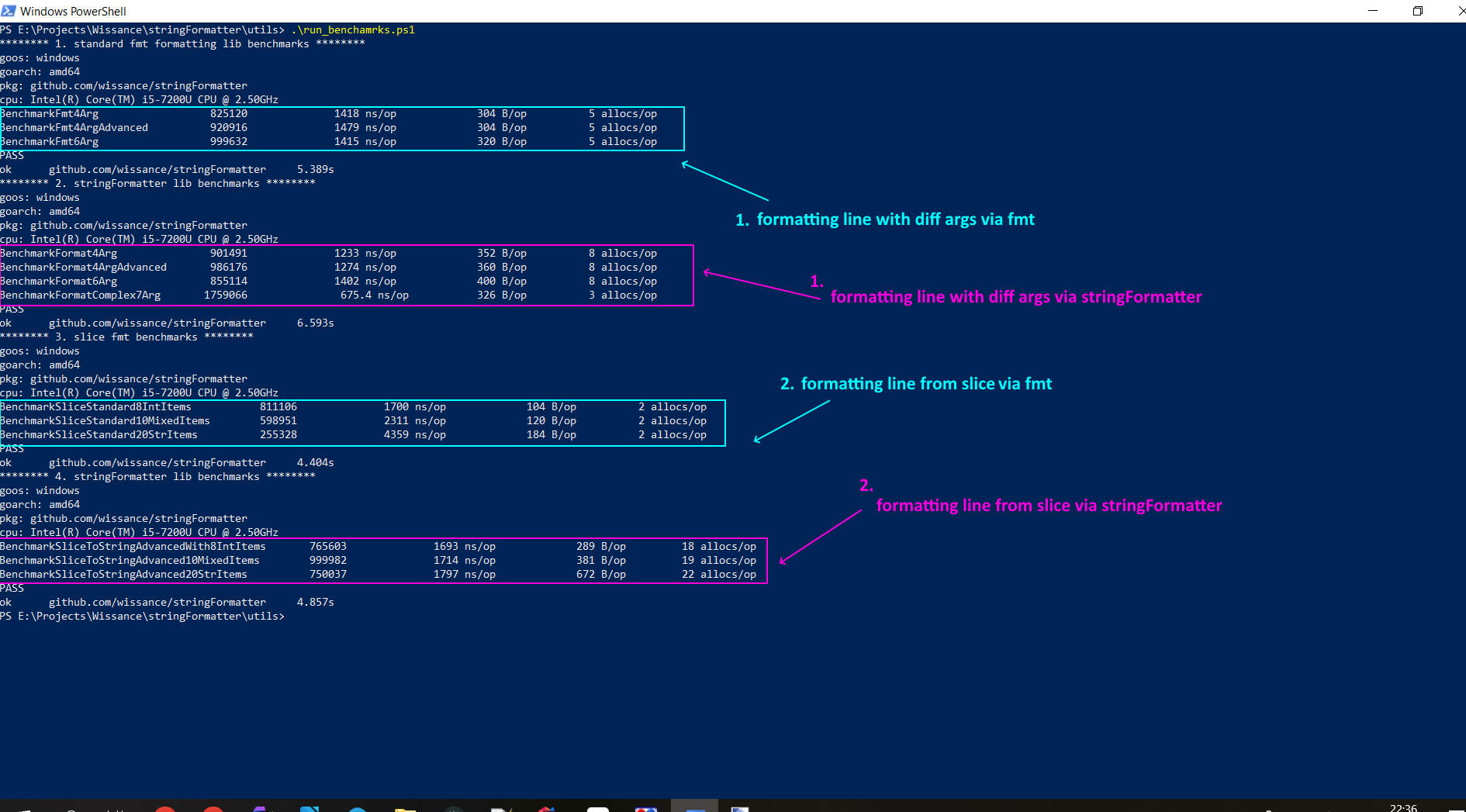stringFormatter
StringFormatter
- A set of a high performance string tools that helps to build strings from templates and process text faster than with
fmt!!!. - Allows to format code in appropriate style (
Snake,Kebab,Camel) and case. - Slice printing is 50% faster with 8 items slice and 250% with 20 items slice





1. Features
- Text formatting with template using traditional for
C#, Python programmers style-{0},{name}that faster thenfmtdoes:
- Additional text utilities:
- convert map to string using one of predefined formats (see
text_utils.go)
- convert map to string using one of predefined formats (see
- Code Style formatting utilities
- convert
snake/kebab/camelprogramming code to each other and vice versa (seestringstyle_formatter.go).
- convert
StringFormatterakasfis safe (SASTand tests were running automatically on push)
1. Text formatting from templates
1.1 Description
This is a GO module for template text formatting in syntax like in C# or/and Python using:
{n}, n here is a number to notes order of argument list to use i.e.{0},{1}{name}to notes arguments by name i.e.{name},{last_name},{address}and so on …
1.2 Examples
1.2.1 Format by arg order
i.e. you have following template: "Hello {0}, we are greeting you here: {1}!"
if you call Format with args “manager” and “salesApp” :
formattedStr := stringFormatter.Format("Hello {0}, we are greeting you here: {1}!", "manager", "salesApp")
you get string "Hello manager, we are greeting you here: salesApp!"
1.2.2 Format by arg key
i.e. you have following template: "Hello {user} what are you doing here {app} ?"
if you call FormatComplex with args "vpupkin" and "mn_console" FormatComplex("Hello {user} what are you doing here {app} ?", map[string]any{"user":"vpupkin", "app":"mn_console"})
you get string "Hello vpupkin what are you doing here mn_console ?"
another example is:
strFormatResult = stringFormatter.FormatComplex(
"Current app settings are: ipAddr: {ipaddr}, port: {port}, use ssl: {ssl}.",
map[string]any{"ipaddr":"127.0.0.1", "port":5432, "ssl":false},
)
a result will be: "Current app settings are: ipAddr: 127.0.0.1, port: 5432, use ssl: false."`
1.2.3 Advanced arguments formatting
For more convenient lines formatting we should choose how arguments are representing in output text,
stringFormatter supports following format options:
- Bin number formatting
{0:B}, 15 outputs -> 1111{0:B8}, 15 outputs -> 00001111
- Hex number formatting
{0:X}, 250 outputs -> fa{0:X4}, 250 outputs -> 00fa
- Oct number formatting
{0:o}, 11 outputs -> 14
- Float point number formatting
{0:E2}, 191.0478 outputs -> 1.91e+02{0:F}, 10.4567890 outputs -> 10.456789{0:F4}, 10.4567890 outputs -> 10.4568{0:F8}, 10.4567890 outputs -> 10.45678900
- Percentage output
{0:P100}, 12 outputs -> 12%
- Lists
{0:L-}, [1,2,3] outputs -> 1-2-3{0:L, }, [1,2,3] outputs -> 1, 2, 3
- Code
{0:c:snake}, myFunc outputs -> my_func{0:c:Snake}, myFunc outputs -> My_func{0:c:SNAKE}, read-timeout outputs -> READ_TIMEOUT{0:c:camel}, my_variable outputs -> myVariable{0:c:Camel}, my_variable outputs -> MyVariable
1.2.4 Benchmarks of the Format and FormatComplex functions
benchmark could be running using following commands from command line:
- to see
Formatresult -go test -bench=Format -benchmem -cpu 1 - to see
fmtresult -go test -bench=Fmt -benchmem -cpu 1
2. Text utilities
2.1 Map to string utility
MapToString function allows to convert map with primitive key to string using format, including key and value, e.g.:
{key} => {value}{key} : {value}{value}
For example:
options := map[string]any{
"connectTimeout": 1000,
"useSsl": true,
"login": "sa",
"password": "sa",
}
str := stringFormatter.MapToString(&options, "{key} : {value}", ", ")
// NOTE: order of key-value pairs is not guranteed though
// str will be something like:
"connectTimeout : 1000, useSsl : true, login : sa, password : sa"
2.2 Benchmarks of the MapToString function
- to see
MapToStrresult -go test -bench=MapToStr -benchmem -cpu 1

2.3 Slice to string utility
SliceToString - function that converts slice with passed separation between items to string.
slice := []any{100, "200", 300, "400", 500, 600, "700", 800, 1.09, "hello"}
separator := ","
result := stringFormatter.SliceToString(&slice, &separator)
SliceSameTypeToString - function that converts typed slice to line with separator
separator := ":"
numericSlice := []int{100, 200, 400, 800}
result := stringFormatter.SliceSameTypeToString(&numericSlice, &separator)
2.4 Benchmarks of the SliceToString function
sf is rather fast then fmt 2.5 times (250%) faster on slice with 20 items, see benchmark:

